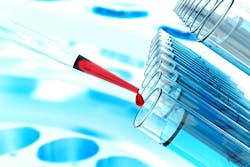Allonnia, the bio-ingenuity company, announced details on its new two-year contract funded by the U.S. Department of Defense’s (DoD’s) Environmental Security Technology Certification Program (ESTCP) on March 12, 2024. The project is an effort to deploy EPOC Enviro’s SAFF (Surface Active Foam Fractionation) units at a DoD military installation in Pennsylvania and remediate PFAS in impacted water sources.
This project will use SAFF to treat PFAS-impacted groundwater and generate small volumes of PFAS concentrate, which will then be used for the demonstration of multiple destruction technologies. This project will evaluate the extent to which SAFF is a cost-effective, commercial, off-the-shelf treatment system for PFAS-impacted water relative to alternative technologies. This ESTCP-funded project is being conducted in coordination with the U.S. Air Force, the U.S. Navy, and the Defense Innovation Unit (DIU), and is the latest example of ESTCP and DIU partnering to accelerate the integration of commercial technology through the DoD.
In recent decades, aqueous film-forming foam (AFFF) has been used to suppress flammable liquid fires, such as fuel fires, across multiple federal installations. However, the PFAS-containing solution was shown to seep into soil and groundwater, creating an environmental and health risk for local communities. Since 2011, ESTCP has funded hundreds of research and demonstration projects to address this issue and develop potential commercial treatment solutions. As one of several solutions being explored, the SAFF units use the natural power of rising air bubbles to separate PFAS from impacted water and concentrate it for later destruction.
“While AFFF proved an effective fire suppression tool for decades, the long-term damage it can cause to the surrounding environment demands practical, scalable remediation solutions to be implemented today,” said Kent Sorenson, CTO of Allonnia. “SAFF uses the elegance of nature to tackle this seemingly intractable problem, and this installation will prove how a fully closed system can remove and destroy the PFAS found in AFFF.”
This ESTCP partnership and prototype demonstration with DIU builds on Allonnia’s expanding work with government facilities, which currently spans eight projects across North Carolina, California, Michigan, Colorado, and Massachusetts, and pairs SAFF with various PFAS destruction technologies. With a treatment capacity of about 100 gallons per minute, it is estimated that SAFF could treat as much as 52 million gallons of water if running continuously over one year – achieving the proposed EPA maximum contaminant level of PFAS for federal facilities.
Today’s announcement follows the 2023 launch of Allonnia’s own ‘forever chemical’ solution – 1,4 D-Stroy™ – a microbe-based solution capable of degrading 99% of the cancer-causing chemical 1,4-dioxane in impacted groundwater into H2O and CO2. Last year, Allonnia also announced a $30M Series A extension to build upon the company’s existing biotechnology and engineered products through adaptive platforms, tackling waste challenges across metals and mining, plastics, and in situ PFAS, plus other emerging chemicals of concern.



